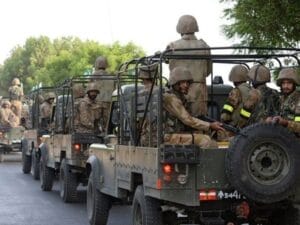Federal Government Grants Special Powers to Security Forces in Balochistan
The federal government of Pakistan has taken a decisive step to enhance security measures in Balochistan, granting special powers to the military and paramilitary forces operating in the region. This move comes in response to rising insurgent activities and security concerns, particularly following a spate of militant attacks in the province. The decision is part of a broader effort to restore stability in Balochistan, which has long been troubled by violence, separatist movements, and socio-political unrest.
Special Powers: What They Entail
Under the new directives, security forces have been granted expanded powers to:
- Arrest suspects without a warrant on suspicion of insurgency or terrorism.
- Conduct searches and raids without requiring prior judicial approval.
- Operate with immunity from legal prosecution in cases of collateral damage or alleged misconduct.
These powers are aimed at enabling security forces to take swift action against militant groups, including the Baloch Liberation Army (BLA) and other separatist factions, which have been responsible for numerous attacks on security personnel and development projects, particularly those related to the China-Pakistan Economic Corridor (CPEC).
Government Justification
The federal government, along with the military leadership, has defended the decision, citing an escalation in insurgent violence that threatens the region’s stability and Pakistan’s economic interests. Balochistan’s strategic importance, given its rich natural resources and the presence of major infrastructure projects like CPEC, makes securing the region a national priority.
A senior government official stated, “The safety of our people and our economic future depends on restoring peace in Balochistan. These special powers are essential for the security forces to neutralize threats quickly and effectively.”
Concerns and Criticism
The decision has been met with criticism from human rights organizations and Baloch nationalist groups, who warn that granting special powers could lead to abuses of authority and further alienate the local population. Amnesty International and other rights groups have expressed concerns over the potential for extrajudicial killings, enforced disappearances, and unlawful detentions.
Political leaders from Balochistan have also voiced their opposition, fearing that the expanded military presence and unchecked powers could deepen the province’s existing grievances with the federal government. “This decision will only fuel more resentment and resistance among the people of Balochistan,” said a local political figure.
Potential Consequences
The move is seen as a double-edged sword. While it may help curb militant activities in the short term, it also risks increasing tensions between the federal government and Balochistan’s population. The special powers could further strain the already fragile relationship between Balochistan and the central government, potentially escalating the conflict rather than resolving it.
In conclusion, the federal government’s decision to grant special powers to security forces in Balochistan is a critical and controversial step. Its success will depend on the careful implementation of these powers and whether the government can balance security needs with respect for human rights and the grievances of the local population.



